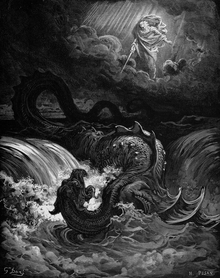Leviathan
Jump to navigation
Jump to search

Leviathan is a sea serpent noted in theology and mythology.
Quotes:[edit]
- Behold the sea, great and immense, | where countless creatures move, | small and large animals. | Ships travel there | and there swims the leviathan whom you created to have fun. (Psalms) [specific citation needed]
- On that day the Lord will punish | with the hard sword, large and strong, | the darting serpent Leviathan, | the tortuous serpent Leviathan | and he will slay the dragon that is in the sea. (Book of Isaiah)[specific citation needed]
- The Mother-Abyss, | that formed everything, | has prepared Irresistible Weapons: | brought into the world [...] ferocious Leviathans, | to which it gave a frightening appearance | and surrounded with supernatural splendor, | thus equating them to the gods: | "Whoever sees them (he said) | lose consciousness! | And let them once launched, | never retreat!" (Enûma Eliš)[specific citation needed]
- The representation of Leviathan is [...] for Job a celebration of the supreme lordship of the Creator who can even allow himself to "play with him like a sparrow, tying him up for the amusement of little girls" (40.29). This is why, according to a Jewish tradition, Leviathan will be killed and prepared for the messianic banquet of the righteous. (Gianfranco Ravasi)[citation needed]
- We probably mean the crocodile, an animal similar to the alligator, but larger and more formidable, with a narrower snout and webbed feet up to the ends of the toes. [...] It seems that the word Leviathan refers to the crocodile in Ps. 74:14 and Isa. 27:1. But in Ps. 104:26, this term evidently applies to some sea monster, perhaps to the whale. Various large cetacean animals are found in the Mediterranean. (Philip Schaff)[citation needed]
- You can fish Leviathan with the hook | and hold his tongue with a cord, | stick a reed in his nostrils | and pierce his jaw with a hook? | Perhaps he will make many supplications to you and will he speak sweet words to you? | Perhaps he will make an alliance with you, | so that you may take him as your servant forever? | You will joke with him like a sparrow, | tying it for your maidens? | The fishing companies will put it up for sale, | will the traders share it? | You will riddle his skin with arrows and with the harpoon his head? | Put your hand on him: | at the memory of the fight, I did not rebuke! (Book of Job)[specific citation needed]
- You have divided the sea with power, | you have crushed the heads of the dragons upon the waters. | At Leviathan you broke the head, | you fed him to the sea monsters. (Psalms)[specific citation needed]
Joseph Campbell:[edit]
- We have clear evidence throughout the biblical text that the Lord Yahweh was himself an aspect of the serpent's power. [...] We will not be surprised then to learn that the name of the priestly tribe of Levi, Yahweh's favorite, derived from the same verbal root as the term Leviathan and that, when paintings of the non-depictable god finally appeared, his form it was that of a god with serpent-shaped legs. [citation needed]
- As Ea defeated Apsu and Marduk defeated Tiamat, so Yahweh did with the sea monster Rahab (Job 26, 12-13) and with the Leviathan (Job 41 ; Psalms 74, 14).
- The literatures of the Iron Age of both the Aryan Greeks and the Romans, and the Semites of the Near Levant repeat the theme of the defeat, by a solar hero, of a despicable monster belonging to a previous divine order and possessor of some treasure : a land, a maiden, gold or simply one's own power.
The main biblical example is Yahweh's victory over the cosmic sea serpent, the Leviathan, of which he himself boasts to Job. [citation needed]
David Quammen:[edit]
- Leviathan is the sacralized example of an alpha predator in a certain culture. Amba is another, Bäru yet another. Similar beliefs and traditions could be cited for jaguars, Nile crocodiles, pumas, reticulated pythons and all the other species of large predators that lived in uncomfortable contiguity alongside humans, of whom they sometimes preyed. The mythical dimension of alpha predators, reflected and amplified in those beliefs and traditions, has contributed significantly to shaping the vision developed by our species of its place in creation.[citation needed]
- This original Leviathan should not be confused with a whale. In later times the name took on this meaning generically, but the biblical Leviathan is something stranger and more frightening. It is a chimerical creature, half crocodile and half dragon, evoked for spiritual purposes by elements of psychological and zoological reality. [citation needed]
- According to one theory, this figure derives from a previous Phoenician monster called Lotan, a seven-headed dragon representing primordial chaos, defeated by the deity Baal. In the Jewish scriptures, Leviathan seems more firmly under divine power. Yahweh is Almighty. Leviathan is powerful, and then comes all the others. The passage quoted from Job is a portrait of the predatory servant of God, a creature who exists to remind humans - poor Job himself and all of us - that we are in third place, not higher, in the food chain of power and glory. [citation needed]


